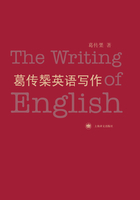
PREFACE
The present volume is a revised edition of my A Textbook of English Composition first published in 1941. The revising has been done in accordance with the same strongly held beliefs as those that I acted upon in writing the original work. These beliefs are as follows:
1. Such a book ought never to lose sight of the fact that it is intended for Chinese students, who have their special difficulties and therefore need special advice and warning. Since they have not been brought up in English-speaking families and since they study English chiefly as something written rather than spoken, they are ignorant of a great many everyday expressions that are only too common on the lips of those whose mother tongue is English. On the other hand, they are quite safe from a great many faults in diction and construction that most English and American students of composition have to take care to unlearn before they can hope to write respectable English.
2. Such a book ought to aim at the art of writing English for prac-tical purposes instead of at authorship. The object of the average student of English composition, whatever his nationality, is to learn to express himself in written English, not to learn to become a professional author.
3. Such a book ought not to confine itself to the treatment of school compositions. While most students may never wish to write professionally, it does not follow that all that they will ever have to do in the way of English composition is to write short essays on given subjects, or what is called in American schools “themes”.
4. Such a book ought not to content itself with imparting a knowledge of the art of writing English. Principles and rules are of little use until they are applied.
5. Such a book ought to give such principles and rules; only as are based upon the actual practice of good authors. Some of those found in nearly every popular manual of composition serve no definite purposes and therefore prove to be only so many handicaps in the path of the writer of English, who has enough to take care of without the interference of those unnecessary “technical” restrictions.
6. Such a book ought to teach present-day English only. living as they do at the present day, students of composition should in no way be taught or encouraged to follow the usage and practice of authors of bygone days.
7. Such a book ought to be written on the assumption that its readers are careful students but that they are not students of precocious abil-ity. No book can teach anything to careless students or to those who feel little or no interest in the subject. Nor is it advisable to take too much for granted in Chinese students of English, who are necessarily supposed to have made progress in their studies with the help of dictionary and grammar.
Whatever shortcomings some critical readers may find in this book, I take a pride in pointing out that the whole work is my own. I should like to make special mention of the fact that the illustrative examples have been, except in a very few cases, taken at first hand, and that for the purpose of collecting such examples I read a very large number of books, newspapers, and magazines. Not a single sentence has been quoted from any work written in the nineteenth century. In this new edition a large number of newer examples have been added or substituted, most of the authors happily still alive.
It remains for me to thank Comrade Yu Shiwen ( Conyoon) for his help in the preparation of this revised edition. I have also to express my gratitude to the late Comrade Gui shaoxu, who was the first to encourage me to write a book of this kind.
Ge Chuangui
October, 1983